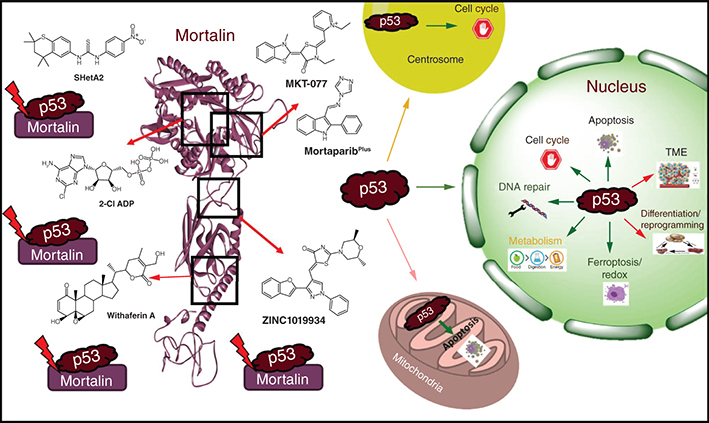Abstract
Functional inactivation of wild-type p53 is a major trait of cancerous cells. In many cases, such inactivation occurs by either TP53 gene mutations or due to overexpression of p53 binding partners. This review focuses on an overexpressed p53 binding partner called mortalin, a mitochondrial heat shock protein that sequesters both wild-type and mutant p53 in malignant cells due to changes in subcellular localization. Clinical evidence suggests a drastic depletion of the overall survival time of cancer patients with high mortalin expression. Therefore, mortalin–p53 sequestration inhibitors could be game changers in improving overall survival rates. This review explores the consequences of mortalin overexpression and challenges, status and strategies for accelerating drug discovery to suppress mortalin–p53 sequestration.
Graphical abstract

Author contributions
HS Akshatha: conceptualization, writing original draft and visualization. M Bhagyalalitha: writing original draft. GV Pujar: conceptualization, writing, review and editing and supervision. R Chandrashekar H: writing, review and editing and supervision. SA Kumar : conceptualization and data curation. S Manisha: investigation and data curation. B Durgesh: investigation and data curation.
Acknowledgments
The authors thank TM Pramod Kumar, Principal, JSS College of Pharmacy, JSS Academy of Higher Education and Research, Mysuru, India, for providing the necessary facilities. The authors would also like to thank BS Mahesh, Department of Psychiatry, Kasturba Medical College, Mangaluru, Manipal Academy of Higher Education, Manipal, India, for unconditional support in completing the manuscript.
Financial disclosure
Akshatha HS thanks the Indian Council of Medical Research, Ansari Nagar, New Delhi, for the award of Senior Research Fellowship no. 3/2/2/45/2022-NCD-III, IRIS ID no. 2021-14568.
Competing interests disclosure
The authors have no competing interests or relevant affiliations with any organization or entity with the subject matter or materials discussed in the manuscript. This includes employment, consultancies, honoraria, stock ownership or options, expert testimony, grants or patents received or pending, or royalties.
Writing disclosure
No writing assistance was utilized in the production of this manuscript.
